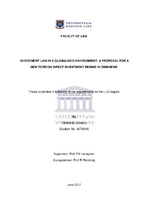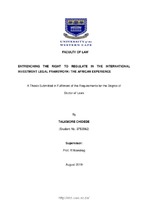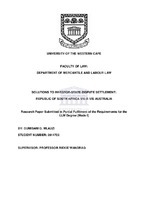RETHINKING INTERNATIONAL INVESTMENT AGREEMENTS IN THE FACE OF COVID-19: NEED FOR THE INCORPORATION OF A FORCE MAJEURE CLAUSE?
Abstract
Covid-19 was first detected in December 2019 in Wuhan, China, and since its detection the pandemic had a disastrous effect on human health and well-being globally, with far-reaching implications for international investments and commercial businesses. Ever since the Great Depression of the 1930s, no single non-conflict event has had the broadest and most significant effects on health and the economy as compared to the novel Covid-19 pandemic. Consequently, it is now difficult to legally distinguish between the virus and the response policies, which have come together to create a singular event. Because of the extraordinary magnitude and scope of both variables which are unprecedented, governments and businesses operating around the globe have faced challenges in controlling their combined consequences.
Notably, the aftermath of Covid-19 has brought the force majeure doctrine into the limelight. Consequently, host states and foreign investors have now found it crucial to thoroughly prepare for the unexpected in a bid to honour contractual obligations by inserting carve outs in IIAs which exempt a defaulting Party from liability owing to an impossibility or impracticability to perform. The study therefore establishes that despite the existing IIAs providing for public health, emergency, and national security clauses, these carve outs do not aptly provide for a defence that would exempt the defaulting party from liability.
Collections
Related items
Showing items related by title, author, creator and subject.
-
Invesment law in a globalised enviroment: A proposal for a new foreign direct invesment regime in Zimbabwe
Kondo, Tinashe (University of the Western Cape, 2017)Most developed countries that enjoy the lion's share of foreign investment do not have domestic legal frameworks on foreign direct investment. This is because investors are attracted by a holistic picture of these countries. ... -
Entrenching the right to regulate in the international investment legal framework: The African experience
Chidede, Talkmore (University of Western Cape, 2019)The existing traditional international investment law regime which is largely based on the conventional European and North American Model Bilateral Investment Treaties (BITs) has come under intense criticism. The argument ... -
Solutions to investor-state dispute settlement : Republic of South Africa vis-à-vis Australia
Mlauzi, Dumisani G. (University of the Western Cape, 2016)The main objective of this paper is to critically analyse the solutions that countries are currently implementing in response to the much-debated issue that the conventional investor-state dispute settlement (ISDS) regime ...



